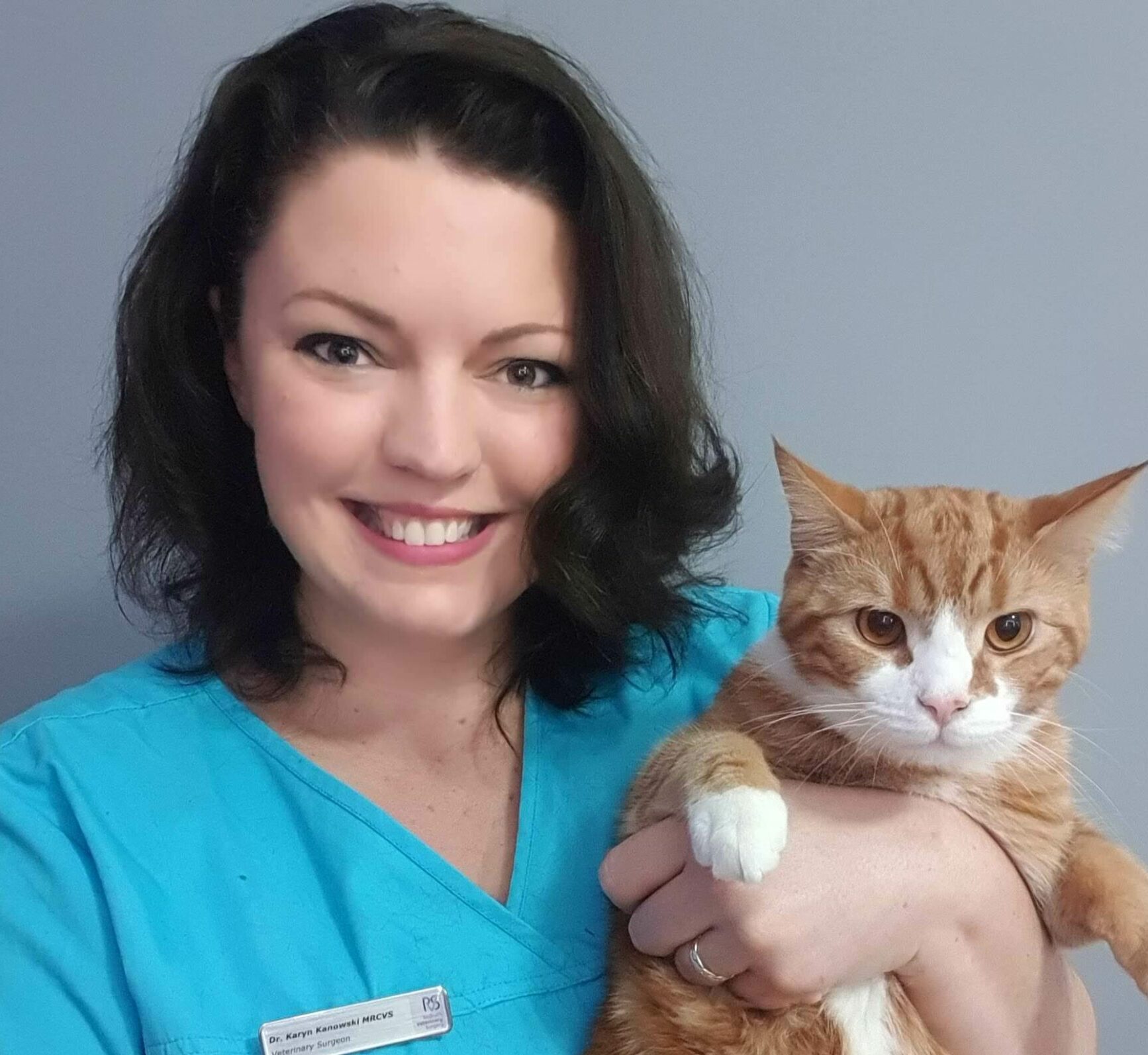Cat Fasting 101: Pros & Cons (Vet Answer)
Updated on
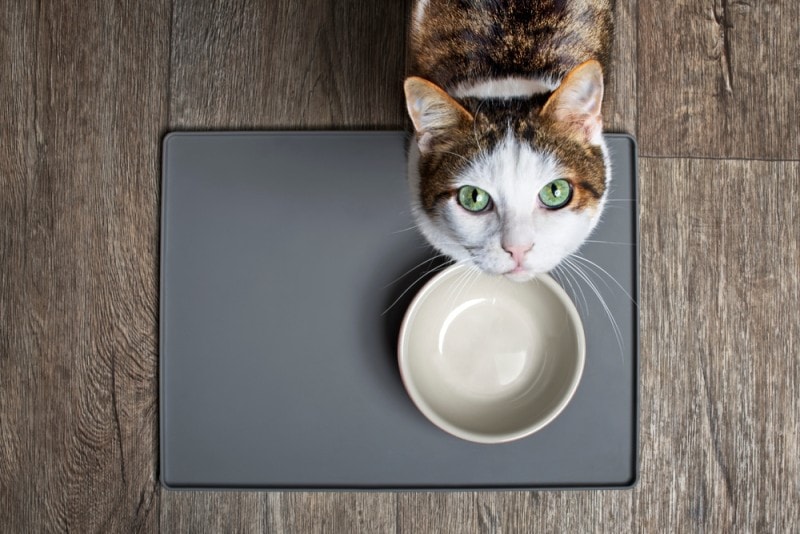
Click to Skip Ahead
With the practice of fasting (or perhaps, more specifically, intermittent fasting) gaining popularity in humans, many people are wondering if the potential benefits can be extrapolated to their pets. Some people are even going so far as to try it on their dog or cat, particularly if they feel their furry friend is tending towards the overweight side.
Chances are, if you’re reading this, you’ve considered fasting your cat. While the premise behind wanting your pet to be healthier is sound, unfortunately, there can be some issues when implementing such feeding practices for your overweight or even obese furry friend. We’ll talk about both the pros and cons of fasting in cats, some alternatives to getting stubborn fat off your cat, and potential complications associated with being overweight.
The Growing Problem of Obesity
Obesity is a significant health concern in cats, as is the case in humans and other species. Also, like humans, obesity is becoming more common in our feline friends. Between 11.5% and 63% of cats have been reported to be overweight or obese. Recently, obesity was formally classified as a disease in cats and dogs, specifically, a low-grade inflammatory disease.
- Diabetes mellitus
- Orthopedic disease (e.g., arthritis)
- Neoplasia (or cancer)
- Skin disease
- Metabolic derangements
- Impaired respiratory function (i.e., impacting normal breathing)
Even though obesity in cats is an ever-growing and severe problem, there is currently limited research on feeding management in cats and, in particular, feeding frequency.
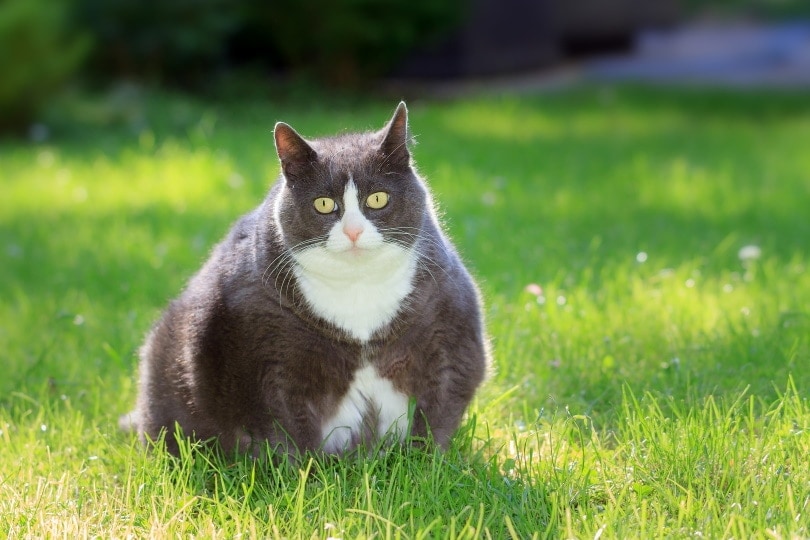
What Does a Typical Weight Loss Plan for a Cat Entail?
Management of overweight or obese cats involves a combination of feeding restricted quantities of a purpose-formulated food and increased physical activity to achieve controlled weight loss. Unfortunately, it’s not that simple, and some studies have shown that less than 50% of overweight/obese cats complete their weight loss program. Various reasons have been implicated; however, often, these arise from owners wanting to discontinue the program prematurely because of either compliance issues or other personal reasons.
While there definitely are advantages to weight loss in overweight cats, it should be done in a controlled fashion, ideally with guidance and input from your family veterinarian, to ensure that the potential complications associated with restricted feeding practices in cats are avoided or minimized.
How Often Should Cats Be Fed?
In some studies, free-feeding and feeding frequently were risk factors for weight gain and associated adverse health conditions in cats. Still, other studies have failed to identify such a link. One study reported that cats fed twice daily were more likely to be obese than cats fed freely.
While the feeding frequency might influence the likelihood of a cat becoming overweight/obese, it’s interesting to note that changes in feeding frequency can also impact activity levels. In a recent study, physical activity was greater in cats fed four times daily compared to those fed once daily. However, actual energy expenditure was similar between the different groups. It is believed that this effect is because cats fed smaller meals more frequently engage in more activity as they search for food.
So, to summarize, we don’t know exactly how many times per day a cat should be fed, as various studies have shown advantages with different approaches that have been suggested. That being said, it does appear to be the case that cats shouldn’t have all-day access to food and that some degree of restricted feeding should be practiced.
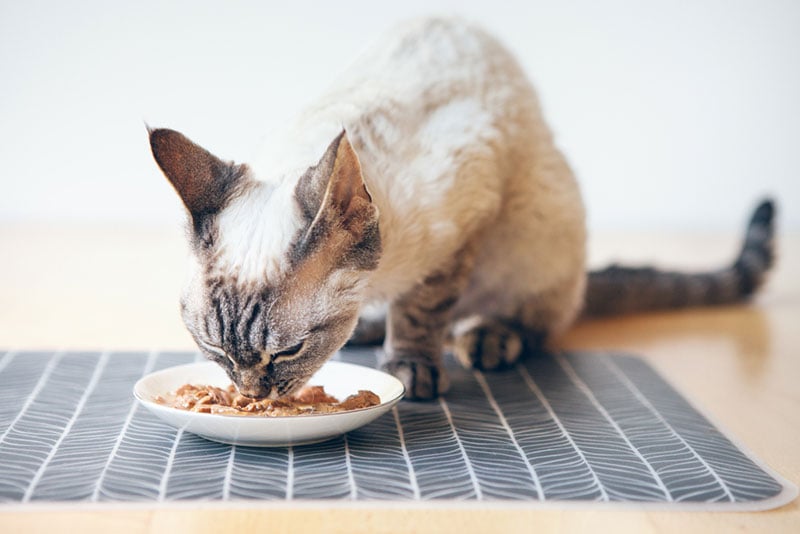
What Are Some of the Potential Benefits of Fasting?
It has been suggested that intermittent feeding or fasting leads to lean tissue accumulation by various mechanisms that promote and initiate protein synthesis while reducing fat mass. In humans practicing intermittent fasting, energy expenditure was not affected by the change in feeding frequency. However, there is an observed decrease in respiratory quotient (RQ) which is suggestive of enhanced fat oxidation or the breakdown of fat into smaller molecules that can be used as a source of energy.
In one of the studies referred to above, cats fed one meal per day instead of four were also shown to have a lower fasting RQ. Data from this study suggest that feeding once a day may be a beneficial strategy for feeding indoor cats to promote satiation and lean body mass. Such a mechanism might be helpful, particularly in senior or geriatric cats, prone to age-related changes in their energy metabolism, leading to a loss of lean body mass (sarcopenia) and body weight. In these cats, a change in their feeding practices might increase their lean body mass by promoting protein synthesis and limiting some of the consequences of sarcopenia.
Taking these conclusions one step further, such a feeding regimen could reduce the incidence of obesity in cats by controlling appetite and limiting feed intake. While such data suggests a role in managing overweight and obese indoor cats, further research is needed to assess potential complications associated with intermittent fasting.
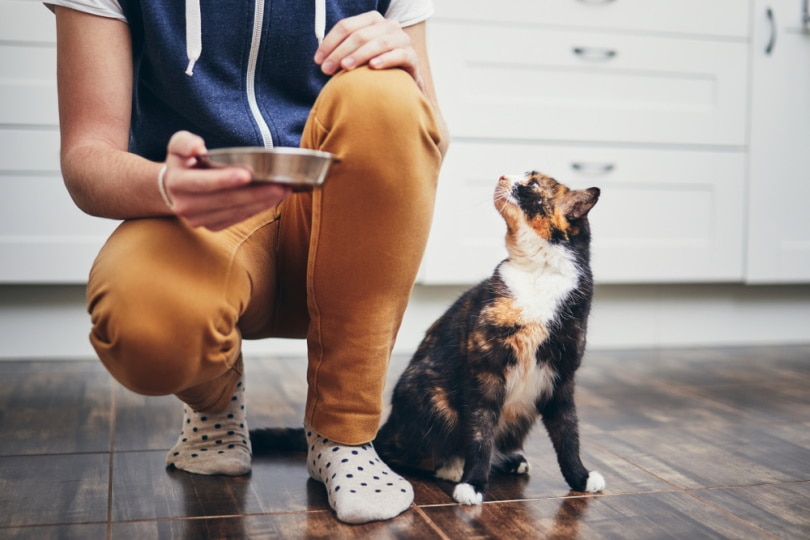
What Are Potential Complications Associated With Fasting?
Hepatic lipidosis is a common and potentially life-threatening problem in overweight or obese cats that enter a catabolic state, either because of an underlying illness or due to a change in circumstances like food availability. As you might be picturing already, there is the potential for (inappropriate) fasting in an over-conditioned cat to precipitate a catabolic state (breaking down nutrients or stored energy) that leads to hepatic lipidosis. This syndrome involves an imbalance between mobilized fat stores and the liver’s ability to process such fatty acids.
Other potential adverse effects of reducing food intake in cats can include behavioral changes (for instance, aggression) and gastrointestinal clinical signs, such as vomiting, potentially related to rapid eating when food is available.
Conclusion
While there clearly are benefits associated with fasting in both humans and cats, it is crucial to realize that these benefits cannot be applied to all cats, and such feeding practices are not always appropriate or even safe in some cases. Given the potential for severe complications, especially in cats with underlying medical conditions, it is vital that you have a consultation with your family veterinarian before embarking on something like intermittent fasting.
Your veterinarian can help tailor a weight loss plan specifically for your (possibly chubby) feline housemate and advise on what feeding practices would best suit your cat’s current state.
Featured Image Credit: Lightspruch, Shutterstock



